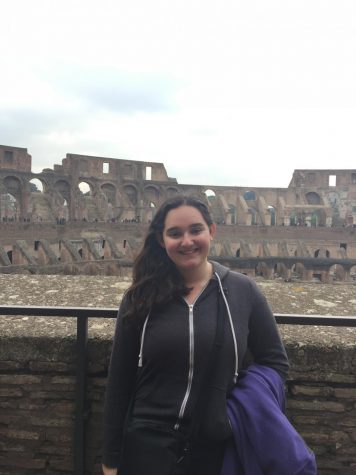Illinois mandates teaching LGBTQ+ history
November 8, 2019
On Aug. 9, Governor Pritzker approved the Inclusive Curriculum Bill, an Illinois state bill mandating the teaching “of the roles and contributions [to history] of lesbian, gay, bisexual, and transgender people” in public schools. The mandate, HB026, goes into effect July 1, 2020.
“I think [the bill] could be fantastic if teachers and schools really embrace it and make comprehensive curriculum and teach it well. I don’t want it to be this thing we have to do because the state told us,” senior and GSA co-counsel Sage Severin said.
At ETHS currently, the amount of LGBTQ+ history taught depends on the teacher, all of whom have various methods for implementing LGBTQ+ history into their classes.
“In the [APUSH/AP Language and Composition] block last year, we watched Paris is Burning. As one thing in my sociology class we’ve been using this text Unapologetic. It’s a black queer, feminist mandate for radical movements… I know Mr. Clemons has a whole specific unit on LGBTQ history. I think we all approach it differently,” history teacher Corey Winchester explained.
Due to a lack in some LGBTQ+ history teaching, some students have taken it upon themselves to learn more.
“I’ve had to go and research a lot on my own… I would go through and try to consume a lot of LGBTQ+ media,” junior Ryan Lardner said.
ETHS students also participate in independent study projects focused on LGBTQ+ history. Severin did an independent study last year focusing on American LGBTQ+ history in the early 1900s to present day.
“I wanted to know more about my culture’s past and my people’s past… LGBT history is human history… There was maybe a line about [the AIDS epidemic] in my APUSH textbook last year… which I found insulting because it changed the country. A lot of things that we know of as just things that society does is a direct byproduct of the fear of disease that occurred during the AIDS epidemic,” Severin explained.
As LGBTQ+ visibility and rights have increased nationwide, so has discussion regarding LGBTQ+ identities at ETHS.
“I started teaching in 1994. I think just out of ignorance I really didn’t teach about topics back then really at all, even like Harvey Milk, the ones that seem obvious to teach about. I started at ETHS in 2008, and I think it’s only been the last five or six years that I’ve done more with those topics then I had in the past,” history teacher Rick Cardis said.
Part of the Inclusive Curriculum Bill also mandates that “the teaching of history shall include a study of the role and contributions of African Americans and other ethnic groups” and “reinforce the study of the role and contributions of Hispanics.” It lists 15 different ethnic groups students should study.
“I think specificity is harder because it is placing value on a specific experience… I think it’s better to create spaces for those moments to be learned, [but] as a queer identifying person, this bill, I think it’s more than necessary,” Winchester said.
The Inclusive Curriculum Bill requires eighth graders to give “evidence of having a comprehensive knowledge” about various identity groups before graduation. The week of Oct. 7, District 65 held an educational week focusing on LGBTQ+ identities.
“I’ve seen some of the plans District 65 has for teaching it in schools, and it’s a lot of making sure people know what they/them pronouns are and how to use them, and I think that is amazing,” Severin said.
Upset with the curriculum, some District 65 parents opted their students out of the classroom during the week, which drew backlash from other community members.
“I guess they think just because if you’re talking about people who are same-sex attracted, since it’s so sexualized in the media, they think it’s all about sex… They shouldn’t be nervous…but obviously parents want to protect their kids,” Lardner said.
Illinois is the fourth state to pass a bill mandating the teaching of LGBTQ+ history in public schools, following California in 2011 and Colorado and New Jersey this year.
“[The ETHS History Department] talked about the passage of the new law in our departments. In the bigger picture, there’s probably five to 10 different topics that the state mandates that we teach, and we do keep track of those things and work to honor those state laws. At ETHS, if people aren’t already talking about these topics, then it will be impetus to do this,” Cardis said.
The Inclusive Curriculum bill was previously introduced in early 2018 as HB5596. It died in committee in May 2018. Senior Grey Miller lobbied for HB5596 as part of an initiative by Equality Illinois.
“It was really cool… When I came back, I wanted to start it [an LGBTQ+ history course] at ETHS; I just didn’t have the capacity to,” Miller explained.
ETHS offers African-American Studies; Chicano Movement; and Sociology of Race, Gender, and Class semester courses primarily for seniors.
“My dream would be to have a gender/sexuality studies course here. Having that as a space for deep-diving into queer histories but that doesn’t mean that the queer histories are taken out of all other history courses,” ETHS Equity Analyst Lauren Hamilton explained, “I know the gender/sexuality courses that I took at Northwestern were transformative [in] my understanding of my own identity and how I engage in with queer folks in general.”
There are a variety of ways teachers can implement more LGBTQ+ history, including indicating when people typically studied in history were a part of the LGBTQ+ community, emphasizing the contributions of LGBTQ+ figures, teaching events critical to LGBTQ+ history alongside other events during the time period and discussing the current state of LGBTQ+ rights.
“When experiences of humans are left out, either intentionally or not intentionally, of learning spaces, it perpetuates the oppression of marginalized groups especially. In an effort to be who we say we are as a district and be equity trailblazers and centering conversations on race and identity, we need to be able to back that up in the classroom,” Hamilton said.











